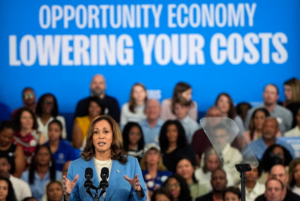Democratic nominee unveils proposals to lower cost of living and advocates ban on price-gouging by big companies

Vice-president and Democratic presidential candidate Kamala Harris unveiled her economic campaign proposal in North Carolina to build what she called an “opportunity economy” focused on the middle class.
She said in Raleigh: “Your salary should be enough to provide you and your family with a good quality of life … such as, no child should have to grow up in poverty. Such as, after years of hard work, you should be able to retire with dignity, and you should be able to join a union if you choose.”

To lower the cost of living, Harris told the rally she intends to cut needless bureaucracy and red tape, pursue investigations of anti-competitive behavior in the food supply, and propose a federal ban on price-gouging in food.
Harris said inflation had fallen below 3% for the first time since March 2021, according to a recent federal report.
“Our supply chains have now improved, and prices are still too high,” Harris said. “Many of the big food companies are seeing their highest profits in two decades. And while many grocery chains pass along these savings, others still aren’t.
“Look, I know most businesses are creating jobs, contributing to our economy and playing by the rules. But some are not, and that’s just not right. And we need to take action when that’s the case.”
Harris’s comments came before next week’s Democratic national convention in Chicago, where political observers might expect to hear more detail about her economic agenda.
North Carolina is also a particular focal point for the new campaign. Barack Obama was the last Democratic presidential candidate to win North Carolina, eking out a win by a 0.32-percentage-point margin in 2008. Recent polling suggests North Carolina is close enough to contest in 2024, and even more so after Harris replaced Joe Biden when he dropped out in late July. Harris said she had visited the state 16 times as vice-president.
In her speech, Harris said she had worked at McDonald’s in her youth and understood the struggle of low-wage work, and that she worked as California’s attorney general to lower drug prices and to go after predatory lending in the housing market.
Red tape and barriers are constraining the housing supply, she said. “By the end of my first term, we will end America’s housing shortage by building 3m new homes and rentals that are affordable for the middle class,” she said.
“And we will make sure those homes actually go to working and middle-class Americans, not just investors.”
The purchase of single-family housing by corporate landlords in the real estate investment trust financial sector has become a significant national political issue.
“It can make it impossible then for regular people to buy or even rent a home,” Harris said, noting accusations of collusion raised by ProPublica in an investigation of the use of RealPage software. The Federal Trade Commission and US Department of Justice filed a joint legal brief in March addressing their concerns about algorithmic price fixing.
“It’s anti-competitive, and it drives up costs,” she said. “I will fight for a law that cracks down on these practices.”
Harris also proposed a $25,000 grant for first-time homebuyers to help with down-payments.
“Under my plan, more than 100 million Americans would get a tax cut,” Harris said, proposing a return of the earned income tax credit and child tax credit, and a $6,000 tax credit for new parents.

She contrasted her proposals to Donald Trump’s support for the FairTax, a national sales tax intended to replace income tax, and said taxpayers would pay thousands more under the proposals contained in the Project 2025 manifesto.
“He [Trump] plans to give billionaires massive tax cuts year after year,” she said. “And he plans to cut corporate taxes by over $1tn, even as they pull in record profits. And that’s on top of the $2tn tax cut he already signed into law as president, which, by the way, overwhelmingly went to the wealthiest Americans and corporations, and exploded the national deficit.
“I think if you want to know who someone cares about, look who they fight for.”



